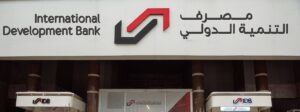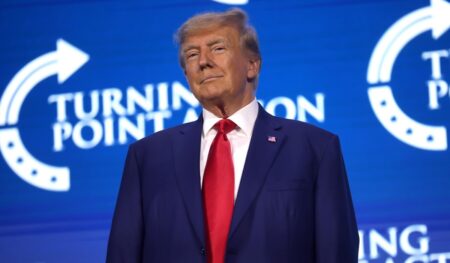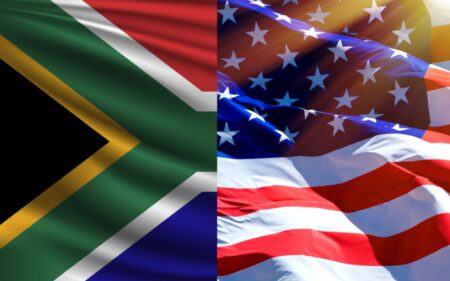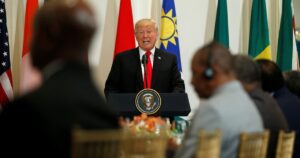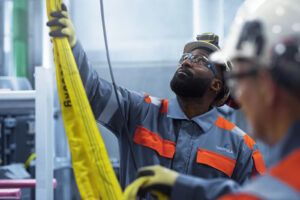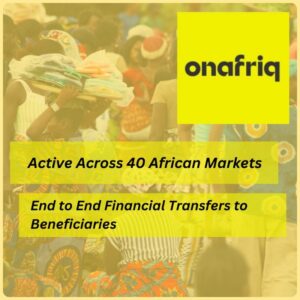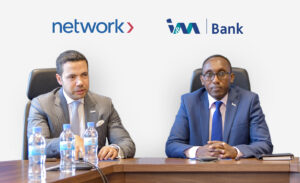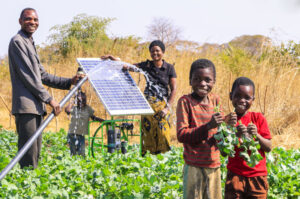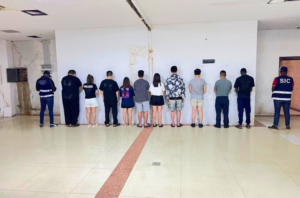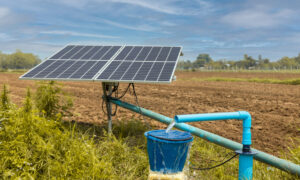- Trump tariffs sting set to ruffle several economies in Africa
- Africa Energy Bank secures key backing from Nigeria, Angola and Ghana
- AIM Congress 2025 gets a boost as International Development Bank signs on as gold sponsor
- African energy: Opportunities and challenges presented by Russia’s investments
- Africa’s smart farming push—a revolution or a mirage?
- BRICS summit in Brazil to focus on global governance reform
- Dedollarization: BRICS take on Trump and mighty dollar
- Trump’s second term: A rare opportunity for real African energy independence
Opinion
- Alignment with Trump’s energy-first ethos would mean that Africa could unlock significant funding for wide-ranging fossil fuel projects, and not just the offshore oil and gas ventures that dominate the headlines.
- The continent should capitalize on all opportunities in onshore projects, wildcat wells (exploratory drilling in unproven areas), and the proliferation of numerous small operators.
- These avenues lead the way to diversity in Africa’s energy portfolio, job creation, and massively strengthened energy security.
Donald Trump’s return to the White House in 2025 represents a pivotal moment for Africa’s fossil fuel industry. His administration’s swift reapproval of a US$4.7 billion loan from the U.S. Export-Import Bank (Exim) for TotalEnergies’ liquefied natural gas (LNG) project in Mozambique — initially greenlit in 2020 during his first term but sent into deep-freeze for the full duration of the Biden years — sets the tone for what could be a transformative era for Africa’s energy …
- Africa will eventually rely primarily on renewable energy, as much of the rest of the world strives to — but on its own timetable.
- To achieve a carbon neutral future, African nations must have the underlying infrastructure and industry to make the dominance of renewables possible.
- But as things currently stand, most African states lack said infrastructure and industry.
There’s a promising future for African renewables as the continent strives to balance its current reliance on fossil fuels. That’s the prediction of the African Energy Chamber’s 2025 Outlook Report on the State of African Energy.
As I have said before, Africa will eventually rely primarily on renewable energy, as much of the rest of the world strives to — but on its own timetable, not that of Western countries who have benefited for centuries from the exploitation of fossil fuels.
To achieve a carbon neutral future, African nations must have …
- Beyond physical infrastructure, Africa’s integration requires modern software upgrades: the systems, policies, and institutional frameworks that power trade across borders.
- By positioning economic transformation at the heart of our integration agenda, Africa can advance up the value chain to generate wealth.
- By effectively mobilizing our own resources first, driving economic transformation, and building both the required software and hardware, we can successfully integrate Africa.
Ask any traveler about their experience moving across parts of Africa, and you will likely hear about familiar challenges: high costs, indirect routes, and unpredictable schedules that can make even the simplest journeys more complicated and costly. These travel hurdles highlight the immense opportunity to further strengthen Africa’s integration and unlock seamless connectivity across the continent.
The potential is undeniable. According to the World Bank, the African Continental Free Trade Area (AfCFTA) stands to be the world’s largest free trade zone, encompassing 1.4 billion people and …
- Majority of 2024’s capex was driven by established producers like Angola and Nigeria.
- Senegal is an example of how operator-friendly policies, political stability, and vast reserves can attract foreign investment.
- Africa holds nearly 18 trillion cubic meters of natural gas reserves, which will prove essential for a just energy transition.
I’ve said for years that African energy is a vital investment. Backers clearly agree — to the tune of $47 billion. That’s how much capital expenditure (capex) 2024 saw in African oil and gas, showing a 23 per cent increase from last year. Better yet, we expect growth to continue through the end of the decade.
This capex activity is a welcome sign that energy majors are deepening their long-term interests in Africa. And as our 2025 State of African Energy report details, their momentum has created unique opportunities for local communities, indigenous companies, and national oil companies (NOCs) from …
- Transition finance is funding dedicated to decarbonizing hard-to-abate and emissions-intensive sectors, such as steel and cement manufacturing.
- Companies in these sectors must prepare for an orderly transition, as failure to act will bring immense risk in a decarbonizing world economy.
- Nurturing a thriving transition finance market is critical to mitigating systemic economic and financial risks.
The transition finance market provides a unique opportunity for Africa to leapfrog to low-carbon technologies and business models, which will address climate risks and enhance the continent’s global competitiveness.
Though lacking a universal definition, transition finance refers to funding dedicated to decarbonizing hard-to-abate and emissions-intensive sectors, such as steel and cement manufacturing.
It is key to overcoming financial barriers to sustainability in the industries essential for economic development yet major contributors to greenhouse gas emissions. Companies in these sectors must prepare for an orderly transition, as failure to act will bring immense risk in a …
- WHO’s move aims to galvanize a coordinated international response to contain and mitigate the spread of mpox.
- An uptick in cases, especially in Burundi, Kenya, Uganda, and Rwanda, along with sporadic cases in Europe, prompted the WHO’s emergency declaration.
- Despite these concerns, mpox is not likely to evolve into a pandemic akin to COVID-19.
Last week, the World Health Organization (WHO) declared mpox (formerly known as monkeypox) a Public Health Emergency of International Concern. This decision underscores the escalating threat posed by the virus, which surged globally in 2022 but has since seen a troubling resurgence, particularly in Africa. The WHO’s move aims to galvanize a coordinated international response to contain and mitigate the spread of mpox, a virus with significant public health implications.
Mpox, a member of the same viral family as smallpox, is a rare but severe infection. It manifests through symptoms akin to chickenpox, including fevers, swollen …
- Existing scientific research in Africa’s renewable energy transition often overlooks certain dispatchable technologies that could enhance grid flexibility.
- Studies primarily focus on zero-carbon dispatchable technologies like concentrated solar power and geothermal, despite their limitations in efficiency, reliability, and cost.
- Balancing engine power plants, which are globally recognized for their flexibility, reliability, and cost-effectiveness, are notably absent in these analyses, despite their potential to run on clean fuels in the future.
It is no longer disputed that solar and wind power will be the foundation of Africa’s future energy systems. They are perfectly suited to the continent’s unique conditions and are already the most cost-competitive power option in almost all cases. This consensus spans academia, businesses, and policymakers who all recognize the potential of renewable energy to meet Africa’s growing needs sustainably.
They also readily acknowledge the intermittent nature of renewables, and the associated need for flexible power capacity within the …
- Creating a “greater purpose” is essential to Onafriq’s corporate culture, driving its growth and unifying Africa’s digital payments.
- Onafriq’s digital payments network connects over 1,300 cross-border payment corridors and facilitates financial access for over 500 million mobile wallets and 200 million bank accounts in 40 markets in Africa.
- Overall, Onafriq empowers small businesses and women entrepreneurs by providing access to digital payment options, asset-based financing services, and additional income opportunities.
Being deliberate about creating a “greater purpose” is essential to building an authentic corporate culture, engaging stakeholders, and navigating the evolving landscape of corporate philanthropy. This is the philosophy behind Africa’s largest digital payments network, Onafriq’s, extensive growth and vision to unify the continent’s digital payments landscape according to its General Counsel and Chief Risk Officer Funmi Dele-Giwa.
Dele-Giwa recently shared insights into the organisation’s unique position at the intersection of social impact and commercial ambition at the Women in …
- The momentum of financial inclusion programmes is progressively strengthened as financial institutions, businesses and consumers embrace cashless convenience and digital payments that are secure and seamless.
- Currently, Rwanda is a prime market for digital payments, with a young population of which 69 per cent is below the age of 30, and the second-highest population density in Africa
The momentum of financial inclusion programmes is progressively strengthened as financial institutions, businesses and consumers embrace cashless convenience and digital payments that are secure and seamless. Technology development broadens the scope of delivery of financial services, and the advantages of digital payments manifest in providing easy access to the masses, reducing travel and queuing times, quicker transactions and seamless money movements that are cashless.
Currently, Rwanda is a prime market for digital payments, with a young population of which 69 per cent is below the age of 30, and the second-highest population density …


